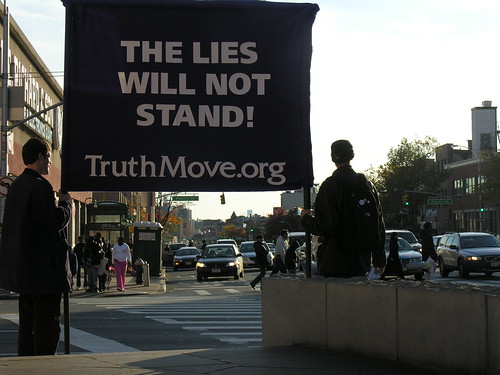 I've been banging my head against a wall. My 'head' is the vision I have and share with others of a more skeptical and effective movement. And the 'wall' is the daunting task of working with people who may not agree on anything other than the movement's basic premises. This movement brings together people from very diverse ideological backgrounds. Within that spectrum my ideal may be positive or even important, but if my participation is depending on impractical expectations I'm walking into a wall.
I've been banging my head against a wall. My 'head' is the vision I have and share with others of a more skeptical and effective movement. And the 'wall' is the daunting task of working with people who may not agree on anything other than the movement's basic premises. This movement brings together people from very diverse ideological backgrounds. Within that spectrum my ideal may be positive or even important, but if my participation is depending on impractical expectations I'm walking into a wall.But if I can have no expectations is this really a social movement at all?
With so little agreement among participants on certain principles of logic and strategy it seems at times that we might all be captains of our own vessel. I'm sure most would say they hoped for an impartial investigation. And there are media we can point to and definitively say are products of the movement. But we won't agree on which one's to promote. And we wouldn't agree on the top or bottom ten 9/11 facts. And very importantly, we might not agree on the intended outcome of all our actions.
We could say that the movement was defined by it's result. But that view ignores focus on the future and improvement. Could we all agree that we want the movement to be stronger, or reach more people in a positive way? What is stronger? Do we even agree on positive? I'm not sure we do.
There are certainly large and overlapping groups within the movement that subscribe to one of many approaches. There's the "Press For Truth" crowd, and the CD crowd, and the AJ crowd, and those who want all of them standing under one big tent. Each of these groups are sizable yet in many ways do not work well together. And who says they should? Some of what we find is total fallacy. Personally, I think that the "Press For Truth" approach is the most effective. But others disagree. And not all that disagreement is based on ignorance of strategy.
What is a social movement without agreed upon motivations, premises, and goals? That certainly presents a lot of problems if it's the case. We don't look unified and our difference can be used against us. The movement can be characterized by it's weakest links. We can become distracted trying to iron out those differences instead of addresses the issues.
Ignoring our differences also presents a lot of problems. As I've previously argued, the 'big tent' is not a viable option. We have no reason to include everything. But that implies some kind of process for exclusion that does not seem to exist. And that's a primary reason why I've been banging my head against a wall.
Just because there are many definitions of this movement doesn't mean that every definition is valid. But there is little anyone can do to exclude what is most damaging or counter-productive. I've personally spent as much time publicly promoting the truth as I have countering fallacy within the movement. There have been a few salient victories. But overall, one of the main reasons for my feeling burned out at times has been my feeling that it's not possible to change the behavior or thinking of people with very different and sometimes invalid views.
I have a clear picture in my head of what would work best, but feel ever more removed from any power to act on that understanding. And feeling that way I get closer to just throwing in the towel.
However, two key insights prevent my quitting in frustration. Central to both of them is the basic fact that those in power very obviously consider our efforts to be a threat.
First, those attempting to obscure the truth want us to feel frustrated and burnout. A good amount of the division I mentioned above is due to intentional disruption. I may not know exactly how much of it, but there is no doubt that divide and conquer gets the job done. This movement is highly subject to infiltration. Most of those involved remain fairly oblivious to that fact, and it's generally unproductive to speculate about the intentions of others. But that doesn't negate the fact that there are many among us who are either keeping track of our efforts or trying to steer us in unproductive directions.
Second, the extent to which those in power by way of their mainstream media attempt to undermine our efforts very clearly demonstrates that at least some of what we do is a threat to them. At times it seems that they consider us more a threat that we might think we are. On a regular basis, seemingly irrespective of movement progress, we find that the MSM launches into a coordinated attempt to malign those involved in this effort. If we were truly irrelevant, we wouldn't find ourselves so often the subject of attack.
And so in some sense, whether or not what we have here is cohesive social movement, the power structure we are trying to impact seems to think it is. That doesn't necessarily make me all that much less frustrated about all the problems I see in this movement. But it does provide a basis upon which I can feel that all these disparate interest groups are presenting a common challenge to those who maintain the secrets we work to uncover.



